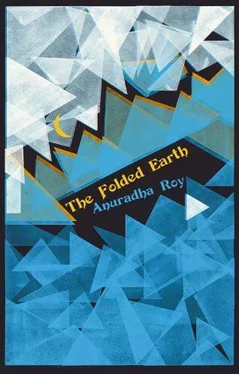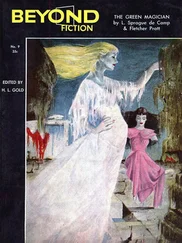The cows grazed on the slopes, her goats scampered about, brass bells tinkling at their necks. Charu’s dog Bijli scurried up and down the slopes, the russet of his coat merging with the pine needles on the forest floor. The cows lumbered away, shaking their horns at him. He trotted back to Charu, parked himself next to her, and wedging his bottom against her for warmth, nibbled his paws one by one.
Charu hummed a tune that she interrupted at times with a yell to stop straying cows, then returned to her wool and knitting needles. The December sun and the soft weight of Bijli on her feet made her drowsy with the comfort of being warm after her cold day’s work milking cows, filling water and washing clothes. Usually her uncle Puran shared the chore of grazing the cows, but the last few days he had been subdued and withdrawn, disappearing into the forest, smoking grass, hardly eating. Charu was used to Puran’s eccentricities and made excuses for him to her grandmother, but it tired her out doing his share of work too. Her eyelids dipped and the sweater-in-progress subsided on her lap.
For once, however, the Mall Road rumours turned out to be true. Sometime in the night, when nobody had been looking, the hotel manager had moved into Aspen Lodge. And now a tentative voice above Charu told her she needed to take her cows away.
“And never bring them back,” the voice went on, sounding a little more determined. Flowers were to be planted now, Sa’ab had ordered. The garden was to be protected from all cattle.
She looked over her shoulder and stood up. She squinted at the boy speaking to her. The sun was in her eyes, she had to shade them with her palm. She saw that he was tall and had curly hair. His eyes had the colour and shine of the horse chestnuts that fell from trees in the autumn. When she frowned, he smiled at her in apology. It was a lopsided smile. His clothes were what anyone wore, but his face looked to her as if it had come off the pages of those magazines that were hung with clothespegs at the newsstand.
She felt herself smiling back and stopped, with some difficulty. He pleaded, “It’s not me, I have to tell you what Sa’ab says. I am only the cook.”
His voice, though young, was richly rounded and deep. She felt she could roll his words on her tongue like smooth river pebbles and taste them. Just like those pebbles, the voice had faint rough edges that her tongue paused against to feel their grain.
She said, “You are not going to cook your Sa’ab the grass, are you? Or has he brought cows with him from the city?”
Like most hill girls, Charu could be tart when crossed and did not take kindly to being told what to do. The boy stammered, “This morning I found a very nice patch down the hill with grass. It has a stream; the cows will have water as well as food. I’ll show it to you, and you can take them there.”
She shrugged in scorn. “You don’t have to show me any grass patches on these hillsides,” she said. “I know them all. The way down to the stream is too steep for cows. But I have many other places. I don’t have to bring them here.”
For two days she stayed away. But on the third or fourth day, something made her leave her house again after she had tethered her cows in their stall. When her grandmother asked her where she was off to, she said she had to take the goats grazing. She skipped lightfooted through the forest to the area below Aspen Lodge and made her way down the steep path to the old Dhobi Ghat. At places where the pine needles on the ground were thick and shiny she let herself slide downward. Her plaits thumped her shoulder blades as she jumped from rock to rock, past the two tiny white Muslim shrines draped with tinselled cloth, and the cave where a leopard was believed to have its lair. Then she was down beside the stream. Its chilled, clear water ran over mossy boulders. At the stream’s edge there were low stone alcoves that washermen had used half a century ago. She sat on one of those and watched her goats feeding. She was sure he would come.
He did not, not that day, nor the next, but on the third day he was waiting there, and on the fourth, and every day after that. Charu’s grandmother asked her why she did not graze the goats closer to home, but she tossed her head and said she was tired of the old places and liked washing clothes in the stream. “I get two jobs done at the same time,” she said. “I should always have been going there.” Every time she went, she made sure to take a bundle of dirty clothes and return with the washed ones that she hung out ostentatiously in their courtyard.
* * *
I have been to the Dhobi Ghat once. You need to be agile: the descent to it is through pine forest and for feet not used to them the needles that cover the ground below the trees can be treacherous. I had to calculate every step so that I did not lose my footing and hurtle down the hillside. Around me the forest stretched for quiet miles, uphill towards Aspen Lodge, which was quite close, though hidden by trees; and on the other side it descended to a valley, which could be crossed for a short cut to the town’s bazaar. At the heart of the forest, I felt as if nothing and nobody existed apart from my own panting breath and aching knees. I kept going, having decided I must. When I reached ramparts of thorny bushes and slippery, mossy rock I hesitated, but at the thought of the steep ascent that was the only way back, I beat down the bushes with my walking stick and pressed on.
Near the end of the steepness, I heard the low gurgle of rushing water. Where the path met the stream there was a flattening, a stretch of soft grass, an opening fringed by trees. There were boulders to sit on, over pools of clear water into which feet could be dangled. Time passed idly down the stream, as I daydreamed, watching insects slide and swoop at the edges and dead leaves flow by.
Because it was so inaccessible, Charu never came across anyone at the Dhobi Ghat when she went down with her goats. This became their most frequent meeting-place, though there were others. She told the boy the names of all her goats. She told him of her five cows, especially of the black and white Jersey cow whom she called Gouri Joshi. Gouri had come as a large-eyed, timid, sweet-faced calf when Charu was a girl and whenever she was troubled or scolded by her grandmother she still ran to Gouri and buried her face in the cow’s warm flanks, breathing in its comforting scent of dung and straw and milk. Gouri’s eyes were dark pools of patience and had lashes that were a mile long. She never kicked, however long Charu held her. The only difficulty was that she was inclined to wander far off and then had to be searched for throughout the forest, and begged to come back home.
“Like you,” he said. “A wild thing.”
He was half-Nepalese, as she was, a child of the hills as well, but from a low-lying small town, so the sounds of the forest did not speak a language he understood. Over the next months she showed him which of the yellow berries that studded the bushes were edible and which ones were poisonous. She showed him how to find the best kafal trees and blackberry bushes, and which persimmon trees could be raided without fear of watchmen. She pulled sprigs of wild oregano from the forest floor and crushed the leaves between her palms and made him breathe in the fragrance. Martens should be chased away, Charu told him, they raided birds’ nests and hen-coops. Foxes could be ignored, but you had to protect your goats from jackals.
He listened faithfully to her lectures, but when it came to a thorn deep in Bijli’s paw, it was he who pulled it out with no fear of the dog’s low growls, and Charu thought she had never known anyone so brave. And once at dusk they saw a leopard slink through the trees into the gorge below. They clutched each other’s hands for reassurance and did not let go long after the leopard had vanished. Charu thought it a kind of magic how neatly her hand fitted within his and how, when she was with him, her shyness left her and she became a chatterbox — as if all the words inside her had been readying and ripening for him.
Читать дальше












